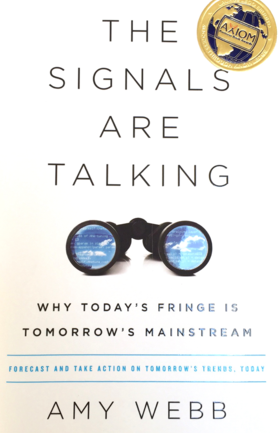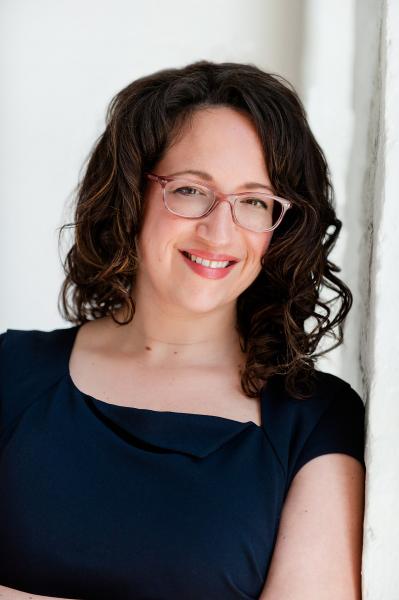- Categories:
Wi13 Keynote Amy Webb on Why Booksellers Should Start Thinking Like Futurists
- By Liz Button
Quantitative futurist and author Amy Webb will appear as one of ABA’s morning keynote speakers at the 2018 Winter Institute in Memphis.
 Webb is a professor of strategic foresight at the NYU Stern School of Business and the founder of the Future Today Institute, a leading future forecasting and strategy firm serving a global client base. She is also the author of three books; her most recent is The Signals Are Talking: Why Today’s Fringe Is Tomorrow’s Mainstream (Public Affairs), which looks at how to predict and manage technological change. The Signals Are Talking was a Washington Post bestseller and was named one of Fast Company’s Best Books of 2016.
Webb is a professor of strategic foresight at the NYU Stern School of Business and the founder of the Future Today Institute, a leading future forecasting and strategy firm serving a global client base. She is also the author of three books; her most recent is The Signals Are Talking: Why Today’s Fringe Is Tomorrow’s Mainstream (Public Affairs), which looks at how to predict and manage technological change. The Signals Are Talking was a Washington Post bestseller and was named one of Fast Company’s Best Books of 2016.
Her 2013 memoir, Data, A Love Story (Dutton/Penguin), about finding love via algorithms, was also a bestseller, and her TED Talk on using data to online date has been translated into 32 languages and viewed more than six million times.
 Webb’s morning keynote will take place from 10:45 a.m. to 11:45 a.m. on Thursday, January 25, in Ballroom C&D at the Memphis Cook Convention Center, where ABA’s 13th annual Winter Institute will take place from January 22–25, 2018.
Webb’s morning keynote will take place from 10:45 a.m. to 11:45 a.m. on Thursday, January 25, in Ballroom C&D at the Memphis Cook Convention Center, where ABA’s 13th annual Winter Institute will take place from January 22–25, 2018.
Bookselling This Week and Webb recently discussed her upcoming keynote speech, including why booksellers may want to adopt a more futuristic way of thinking, the role of emerging technology in our near future, and whether artificial intelligence could affect the book industry.
Bookselling This Week: What will your keynote speech be about, and what form will it take? What will booksellers learn?
Amy Webb: I’ll talk in detail about how to think like a futurist, using my research on the near-futures of artificial intelligence, automation, and content. My observation is that there’s a lot of misplaced optimism and fear when it comes to emerging technology. Independent booksellers have had a terrific few years, and while that’s good for business, it might actually cause them problems in the future. I’m going to show them various scenarios for the next decade and urge them to start thinking like a futurist. To aid in that effort, I’m going to give all of the attendees a folder full of actionable insights and resources that they can put to use as soon as they return home.
BTW: What led you to write The Signals Are Talking?
AW: We’re standing at the event horizon for a number of groundbreaking technologies — artificial intelligence, genomic editing, cryptocurrency platforms, autonomous vehicles, ultra-fast computer systems — and I’m extremely concerned that too few people are thinking through the next-order impacts they will bring. Technology is evolving faster than our government’s ability to legislate, but that’s only the beginning. We’re now seeing bias within the systems that will ultimately make decisions on behalf of humans. Collectively, we’ve fetishized the future, as if we have no agency in what comes next. I believe that every single one of us has the ability to create our preferred futures. So I wrote Signals to help others listen for weak signals, spot trends early, and learn how to create and test scenarios. Shortly after the publication of Signals, which includes my methodology for forecasting, I open-sourced my entire body of research and all of the tools and frameworks I use. I even created free syllabi and coursework for high school teachers and college professors. The only way to confront what’s on the horizon is to be smarter about the decisions we’re making in the present.
BTW: The trend toward online retail and the invention of e-books are the most recent technological disruptors to the book industry. What do you think the next disruptor will be, and what can booksellers do to adapt?
AW: So that’s the tricky thing about the future. There are so many potential disruptors — from digital assistants to precision medicine to landscrapers and urban micro-farms. To prepare for the future of one thing — in this case, bookselling — you really must pay attention to myriad things simultaneously. If not, it’s akin to looking at the expansive future through a pinhole. The best advice I have is to listen for weak signals at the fringe and to track them as they move towards the mainstream. One of the frameworks I’ll show during my keynote explains how to take incremental actions, which will help everyone be more flexible in their thinking.
BTW: Can you see artificial intelligence (AI) having an effect on the bookselling and publishing worlds? If so, in what ways?
AW: Though it doesn’t feel like it, our generation is living through a great period of rapid transition from conventional computing to artificial intelligence. We are entering the fourth era of computing. This moment in time is similar to the few decades when the steam engine gave rise to the Industrial Revolution, and Edison and Westinghouse brought electricity into our homes, offices, schools, and factories. AI is the new electricity, and our personal data is what’s generating the current. AI will literally affect every facet of everyday life. So it’s imperative that booksellers understand now what AI is, what it isn’t, and how it might evolve. In fact, my upcoming book is a manifesto that describes the great AI awakening as we transition from artificial narrow intelligence to artificial general intelligence and artificial super intelligence over the next five decades. For those familiar with Asimov’s Three Laws of Robotics, I’ll make the argument that they were flawed from the outset and will propose that instead, we must adopt new bill of rights for AI, machines, and the future of humanity.
BTW: What has been your personal experience with independent bookstores?
AW: In sixth through eighth grade, I was on my school’s Future Problem Solvers of America team, and then I was a competitive debater in high school and college. I spent weekends in libraries and in local bookstores reading and asking for recommendations. I had a closer relationship with my local booksellers and with our local librarians than many people have with their extended family. Like everyone, I have unique tastes and preferences that algorithms don’t quite understand — when I need a great new historical fiction or thriller, the folks at my local bookshop take into account voice, geography, time period, and more. Even now, with unlimited access to buy whatever I’d like online, I can’t function without my local bookseller.
Webb’s keynote will take place in Ballroom C&D at the Memphis Cook Convention Center from 10:45 a.m. to 11:45 a.m. on Thursday, January 25.
Winter Institute 13 is made possible by the generous support of lead sponsor Ingram Content Group and from publishers large and small. See the full Winter Institute program here.

